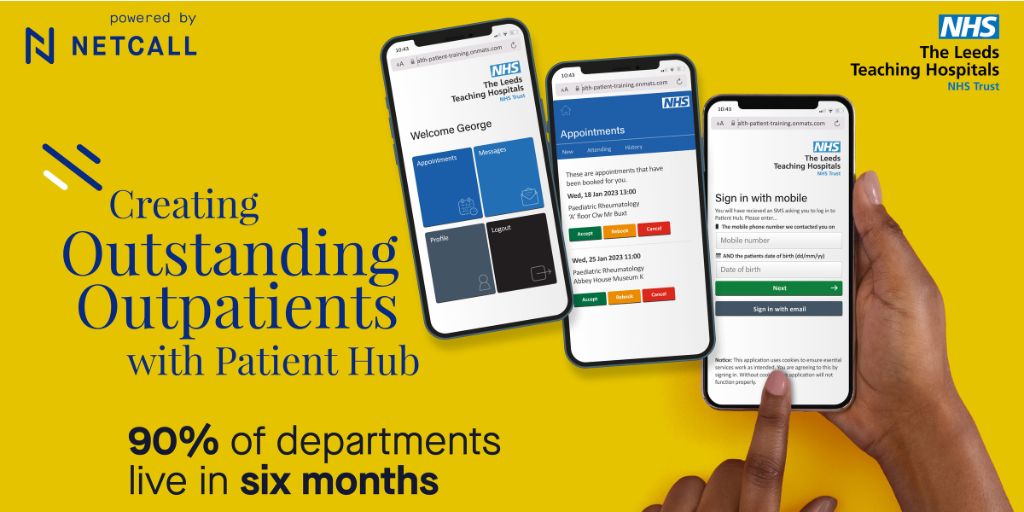Leeds Teaching Hospitals NHS Trust (LTHT) is one of the largest UK acute hospital trusts, treating 1.5 million patients across 7 hospitals annually. Its goal is to deliver the right treatment, at the right time, in the most efficient way.The challenge
As part of the Trust’s post-pandemic Operational Transformation, and with the successful implementation of a modern call centre solution, Outpatient Transformation is one of the key strands. The Trust needed a modern, efficient and sustainable digital solution that would improve interactions — by creating more capacity for patient self-service — provide a better patient experience and optimise productivity.
- Resource-intensive tasks and associated costs
Managing 5,000 outpatient letter templates across 7 hospitals was extremely challenging. Audit and governance were difficult, errors caused delays or sent patients home, and training for new employees was time-consuming. LTHT needed a solution to reduce the time to manage, print and mail appointment letters as well as the associated costs.
- Back-office efficiency
Manual record keeping and query resolution was cumbersome, with back-office teams left frustrated as they managed, communicated and rearranged patient appointments. By streamlining and digitising these processes, LTHT could boost efficiency and reduce errors, whilst also allowing for colleagues to undertake more patient-focused work.
- Lack of real-time data
Delayed letters and a shortage of real-time information meant clinicians were unable to easily respond to changes — leading to workarounds and even double bookings.
The solution
- Patient Hub adoption
Patient Hub has created the capacity for patients to accept, cancel or request another appointment themselves. By digitising these interactions across all 7 hospitals, efficiency rates have grown dramatically. To date, 92% of specialties have clinics in Patient Hub. And for those live specialties, approximately 65% of their clinics are now in the hub. increasing weekly as more clinic services go live.
“We have 1,000s of outpatient appointments to manage and the mail delays have a big impact. 90% of specialities have already transferred to digital.” – Janine Sexton, Speciality Manager, Leeds Teaching Hospitals NHS Trust.
- NHS APP integration
NHS England is underwriting a digital country-wide project to empower patients by scaling up digital access to appointment information via the NHS App on their smartphones. LTHT is a pioneer Trust, working with Netcall to support the national rollout.
- Focused rollout
The project team used the Leeds project delivery lifecycle (PDLC) approach to follow the 5 trust values, The Leeds Way. With subject matter experts in finance, procurement, information governance and integration, the team implemented a phased departmental roll-out over 7 months, with stage-gate and weekly and monthly checkpoints to manage any red flags and mitigate risk of disruption.
The team invested heavily in Communication and Patient Engagement, backed by a comprehensive communications plan, and based on cross-functional working with vendors and other award-winning peers. Colleagues engaged with the patient forums and took a step-by-step approach to ensure they could manage any patient exceptions such as safeguarding.
The benefits
- Increased staff capacity
Digital patient uptake via Patient Hub was fundamental to increasing staff capacity and cutting costs – benefitting colleagues across all specialties and freeing them up to deliver value-add elective recovery work
- Communication
The new developments for Patient Hub to help manage specific patient groups will allow LTHT to increase coverage. Tailored digital letters enabled easy inclusion of speciality paragraphs, that are simple to view, edit and update. Trust-wide updates, such as for directors, can be made in real-time. Information governance and auditing are improved.
- Back office efficiency
By releasing staff from relentless processing, Patient Hub is empowering teams while delivering significant cost savings and sustainability benefits. And clinics are running at optimum capacity, thanks to reduced Did Not Attends and the ability to flexibly manage change.
“We are excited to have gone live with Patient Hub on the NHS App, which is a big step forward for us. Leeds is one of the first Trusts to go live with this initiative to support the overall goals of driving up patient engagement and feedback so far has been extremely positive with more patients accessing Patient Hub for their Outpatient appointment details.” – Rob Child, Programme Manager (Outpatients CSU), Leeds Teaching Hospitals NHS Trust.
Key results:
- 88.4% less manual processing activity
- 92% of specialties have clinics in Patient Hub
- 65% clinics live with self-service
- 2,250 patients self-serve daily (70% of 90% of services)
- Back-office non-cash and productivity savings expected > £2million
- 99.9% reduction in letter templates to only 5
- 70.2% of patients with a valid mobile/email respond
- Rapid implementation in 6 months
- Better productivity through reallocation of staff time and freeing from manual processing
- Reduced DNA rates e.g. halving paediatrics DNA (previously 12.5%)
- Improved clinic utilisation and focus on elective recovery needs
- More accessible services
“The new system means if patients aren’t going to attend, they call immediately to rebook. We’re aware of problems ahead of time. Our team is proactive now and can make better use of our capacity. In December, we continued to send paper letters. In January, we were able to stop paper letters. Our team can now focus on elective recovery and waiting list management. The biggest success has been the rescheduling of minor dermatology surgery. We can fast-track skin cancer patients with quick contact. Patients ring back on the same day.” – Janine Sexton, Specialty Manager, Leeds Teaching Hospitals NHS Trust.









